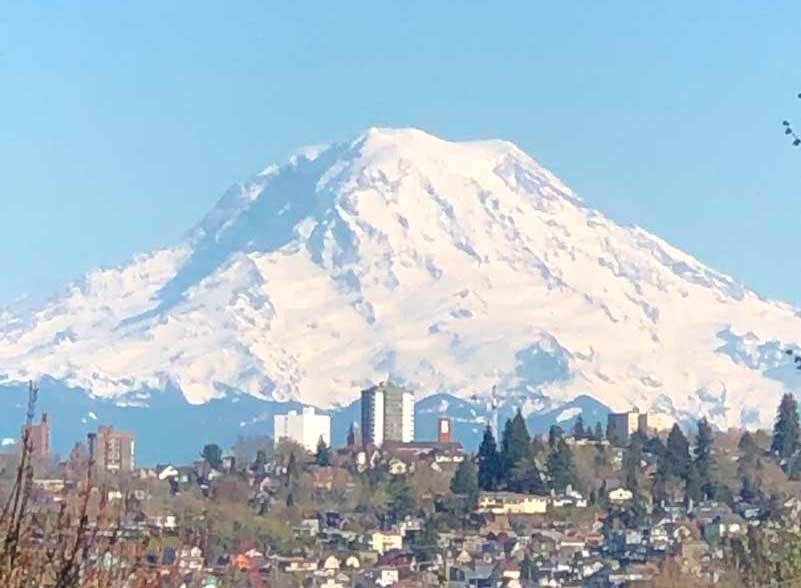By Morf Morford
Tacoma Daily Index
Is it yet another example of “cancel culture”, a move to “decolonize” our landscape, a return to a historic native name, or a surrender to “political correctness”?
Or is it all of the above?
Whatever you want to call it, the conversation over the name, and possible renaming of the mountain that literally dominates our landscape has emerged with a fury, yet again.
For some of us, especially historians, Native peoples around the state, and many of us from Tacoma, the issue never went away.
The argument over changing the name was recently inflamed by a local television news station segment.
And, as expected in our not-terribly-historically-literate, but highly polarized national and local atmosphere on virtually every issue, the positions were staked along familiar lines.
As a telephone survey might put it, virtually everyone, predictably, fell along the lines of “Strongly agree, agree, disagree or strongly disagree”.
The basis of such agreement was, as always, revealing.
The arguments in support of a name change (actually a return to the original name) were primarily an appeal to history, Native identity and local (especially in Tacoma) association with its namesake.
I’ll admit to some bias here, but the arguments against a name change/reversion seemed paltry, if not weak to the point of near absurdity to me.
One of the arguments against the name change was that “Mt. Rainier has always been the name of the mountain”.
The word “always” raises red-flags for me. Almost nothing has “always” been true.
“Rainier” has been the popular, if not official name of that mountain for barely over a hundred years.
Back then the mountain’s name was one of many fierce political battles between Seattle and Tacoma.
Details on the Tacoma-Seattle rivalry on this issue can be found here orhere.
Much to no one’s surprise, a prominent Seattle brewery, with much civic support from city fathers of the time, won the battle on behalf of an Englishman who never saw the mountain and in fact was a naval officer in the British military fighting against our nation in its pivotal Revolutionary War.
How the name of a literal enemy of our nascent set of colonies became associated with the dominant, if not defining feature of our state’s landscape, if not identity, is a puzzle best solved by historians, but how it was ever acceptable to our state will forever be a question.
The Mountain (as many of us call it) is the highest point in our state, and the highest and most distinct peak in the Cascade Range.
It is an active volcano, one of the most dangerous in the world in fact. It’s on the short list of the world’s most dangerous volcanoes – right up there with Etna, Vesuvius and Mauna Loa.
The actual historic name is close to (but not quite the same as) our word “Tacoma”.
A Native name, unlike a name applied by would-be colonial powers (in this case Captain George Vancouver in 1792) is a name that emerges from use or some inherent strength or power.
English transliteration of Native words will never be exact, and many tribes within sight of the mountain had slightly different pronunciations and understandings of what the mountain represented, but some of the long historic meanings are “snow covered mountain”, “mother of waters” or “the god who is always there”.
In 1890, the United States Board on Geographic Names declared, in an act we would now consider “cancelling” that the mountain would be known as Rainier.
The US Congress considered a reversion to a more locally, or at least historically, relevant name several times.
In contrast to the wailing of the apostles of cancel culture, this is nothing new. In fact Alaska’s Denali (the highest peak in North America) was once called Mt. McKinley (from 1917 to 2015).
The state of Alaska changed the name in 1975 with the US Department of Interior making it official in 2015.
In short, in can be done and it has been done.
And no, the cost of replacing all of the signs and brochures is not that much.
My personal bias is that any geologic feature as dominant as a mountain should not be named after any individual, let alone one that was our sworn enemy at a crucial time in our nations’s history.
In a sane time, I would assume that any patriot who was proud of our country and certainly our region, would stand up for a name that actually represented us and our area.
The Mountaineers, a neutral party in the Seattle-Tacoma civil conflicts, came out in support of the restoration of the native name.
The News Tribune weighed in with this column.
I find it fascinating that those who support the current name argue on the basis of familiarity (“it’s always been called Rainier”) or cost (of signage and marketing brochures) but rarely if ever on the merits of Peter Rainier.
In other words, inertia and money trump identity and history.
Patriots, historians, Native peoples and all advocates of relevant and meaningful place names should unite in a move to change the name to, at minimum, an approximation of a respectful name.






